Americans see China as a growing superpower – and increasingly say it is the world’s leading economy
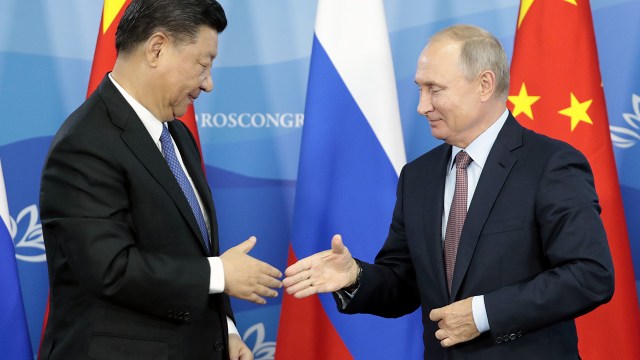
Pew Research Center conducted this study to gauge American views of China. For this analysis, we surveyed 3,581 U.S. adults from March 21 to 27, 2022. Everyone who took part in this survey is a member of the Center’s American Trends Panel (ATP), an online survey panel that is recruited through national, random sampling of residential addresses. This way nearly all U.S. adults have a chance of selection. The survey is weighted to be representative of the U.S. adult population by gender, race, ethnicity, partisan affiliation, education and other categories. Read more about the ATP’s methodology.
Here are the questions used for the report, along with responses and its methodology.
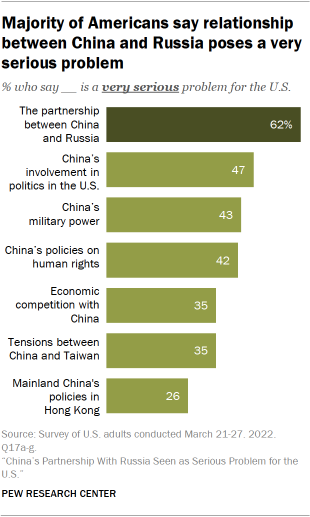
As war rages in Ukraine – one which China thus far has refused to condemn – Americans are acutely concerned about the partnership between China and Russia. Around nine-in-ten U.S. adults say it’s at least a somewhat serious problem for the United States, and a 62% majority say it’s a very serious problem – more than say the same about any of the other six problems asked about, including China’s involvement in politics in the U.S., its policies on human rights and tensions between China and Taiwan, among others.
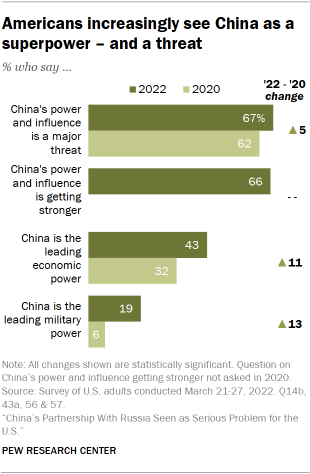
Alongside the specific concern about the China-Russia relationship is a sense that China is a world superpower. About two-thirds (66%) of U.S. adults say China’s influence on the world stage has grown stronger in recent years. More Americans now also describe China as the world’s leading economic power. Around four-in-ten (43%) call China the world’s top economy – as many as say the same of the U.S. This marks a significant departure since 2020, when 32% of Americans said China was the world’s top economy and 52% named the U.S. This double-digit increase returns the share of Americans who consider China the world’s top economy to levels last seen in 2014.
And while Americans still unambiguously consider the U.S. to be the world’s leading military power – 70% say this, compared with 19% who name China and 9% who name Russia – the share naming China has more than doubled since 2020.
China’s power and influence is also seen as a growing threat to the U.S. Today, two-thirds describe China as a major threat – up 5 percentage points since 2020 and 23 points since the question was first asked in 2013. Notably, despite the conflict in Ukraine, this is similar to the share who describe Russia’s power and influence as a major threat (64%) to the U.S.
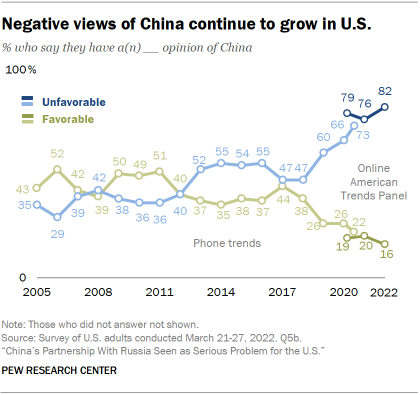
Negative views of China have also increased slightly over the past year. Around eight-in-ten (82%) have unfavorable opinions of China, including 40% who have very unfavorable views of the country. This is a 6-point increase in negative views from 2021 and a new high since the Center began asking this question on its American Trends Panel in 2020. The current reading is also a record reading of unfavorable opinions since 2005, although the mode shift from phone surveys to the online panel makes it difficult to directly compare today’s numbers with data from before 2020.
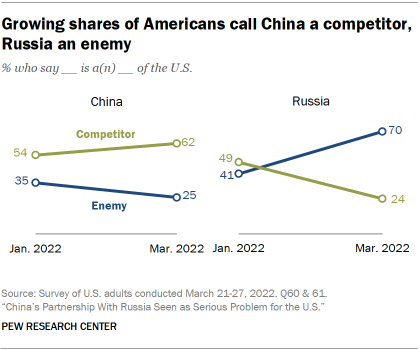
But, even while negative views of China have grown, Americans increasingly see China as a competitor and not as an enemy. Currently, 62% identify China as a competitor and 25% an enemy, with 10% seeing China as a partner. In January, only 54% chose competitor while 35% said enemy, almost exactly the same shares as the year prior. In the same two months, after Russia’s invasion of Ukraine, the opposite shift occurred in the shares of Americans who call Russia an enemy or competitor.
As has consistently been the case in recent years, Republicans and independents who lean toward the Republican Party tend to have more negative views of China than Democrats and independents who lean toward the Democratic Party – 89% vs. 79%, respectively. Republicans are also much more likely to call China an enemy than Democrats and to describe China’s power and influence as a major threat to the U.S.
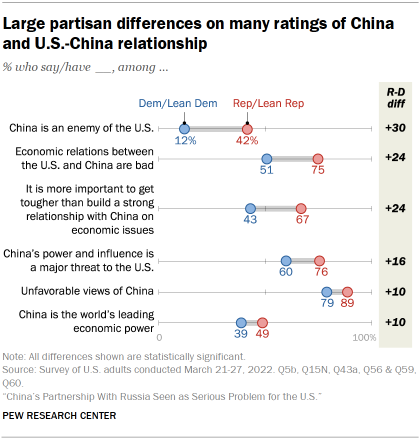
Differences are particularly large when it comes to economic issues: Republicans are more likely than Democrats to say the China-U.S. economic relationship is bad and to prioritize getting tough on China on economic issues. Views of the world’s leading economic power also differ by partisanship, with 49% of Republicans naming China as the top economic power and 39% of Democrats saying the same. But the share of Republicans naming China as the top economic power has almost doubled since 2020, while Democratic views on China’s economic dominance have remained largely unchanged.
These are among the key findings of a new survey conducted by Pew Research Center on the Center’s nationally representative American Trends Panel among 3,581 adults from March 21 to 27, 2022. The survey also finds major differences in views of China between older and younger Americans. Older Americans are more likely to have negative views of China, to say the China-U.S. relationship is bad and to describe China as an enemy. Older Americans are also more likely than younger adults to see nearly every issue in the bilateral relationship as a serious problem for the U.S. The age gap is most acute when it comes to tensions between China and Taiwan. While 52% of Americans ages 65 and older consider tensions between China and Taiwan a very serious problem, 26% of those ages 18 to 29 say the same. A 25-point gap is also present when Americans think about the partnership between China and Russia.
Unfavorable views of China at new high
Today, 82% of Americans have unfavorable opinions of China, about half of which are somewhat unfavorable (42%) while the other half are very unfavorable (40%). This is a 6-point increase in negative views from 2021 and a new high since the Center began asking this question on its online American Trends Panel in 2020. The current point is also a record reading of unfavorable opinions compared with almost two decades of surveys conducted by phone.
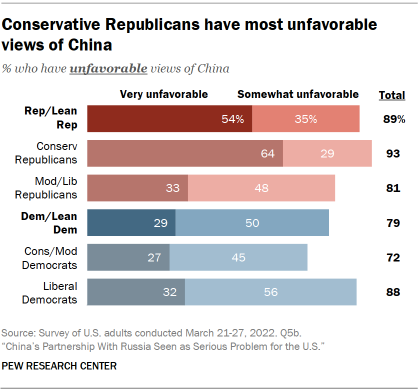
While negative opinions are high across partisan and ideological groups, Republicans and Republican leaners are more likely than their Democratic counterparts to have unfavorable views of China. Notably, there are ideological distinctions within these partisan groups. Larger shares of conservative Republicans and liberal Democrats hold negative views than do those who are more moderate. Conservative Republicans are particularly likely to have very unfavorable views of China (64%) – about twice as much as the share of any other ideological group.
The concentration of unfavorable views also varies between age groups: 90% of those ages 65 and older see China unfavorably, compared with 76% of adults under 30. Additionally, 86% of men view the country negatively, compared with 78% of women.
China seen as competitor rather than enemy of the U.S.
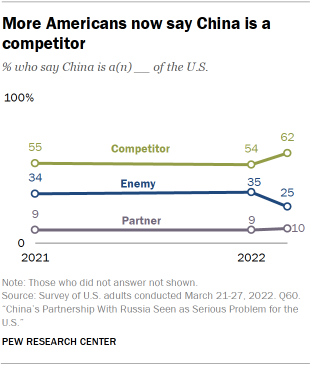
Largely negative views of China are accompanied by negative views of the China-U.S. relationship. Seven-in-ten Americans say that relations between the U.S. and China are bad, including 58% who say the relationship is somewhat bad and 12% who say it is very bad. Alternatively, while 28% say it is somewhat good, fewer than 1% describe the current relationship as very good. Nearly four-in-ten adults under age 30 believe relations are good – at least 10 percentage points more than any other age group over 30.
From January to March of this year, the proportion of Americans who see China as a competitor or enemy of the U.S. changed significantly. Currently, 62% identify China as a competitor and 25% an enemy, while 10% see China as a partner. In January 2022, only 54% chose competitor, while 35% said enemy – almost exactly the same shares as the year prior. In the same two months, after Russia’s invasion of Ukraine, the opposite shift occurred in the shares of Americans who call Russia an enemy or competitor.
There are clear partisan differences to this question: Democrats and Democratic leaners see China as a competitor at higher rates than Republicans, and Republicans are more likely to call China an enemy than Democrats. Republicans are also about equally likely to say China is a competitor or enemy rather than a partner, a reversal from January when they were most likely to consider China an enemy.
Just as more adults under 30 say the China-U.S. relationship is good, they are also more likely to call China a partner: 17% say this, compared with just 4% of those ages 65 and older. At the same time, 36% of older adults think of China as an enemy, while just 16% of the youngest age group say the same.
Americans have a negative outlook on economic relationship with China
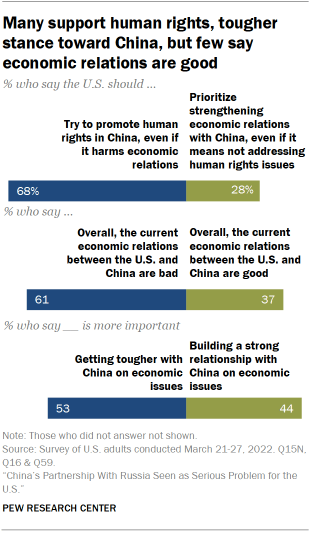
Americans also say that current economic relations between the U.S. and China are bad. Though the relationship is viewed negatively, more than half favor taking a tough stance with China on economic issues rather than strengthening the relationship. Only 28% say the U.S. should prioritize the economic relationship, even if it means ignoring human rights issues. These views have changed little in the last year.
Across each of these variables, there are major differences between partisan groups. Three-quarters of Republicans and GOP leaners say the China-U.S. economic relationship is bad, while just over half of Democrats and Democratic-leaning independents agree. When choosing between building a strong economic relationship and getting tough with China on economic issues, the majority of Democrats (54%) pick strong relations, while the majority of Republicans (67%) prioritize getting tough with China. Majorities in both parties favor promoting human rights, though Democrats do so at a slightly higher rate (71% vs. 66%).
Americans continue to view China’s power and influence as a major threat
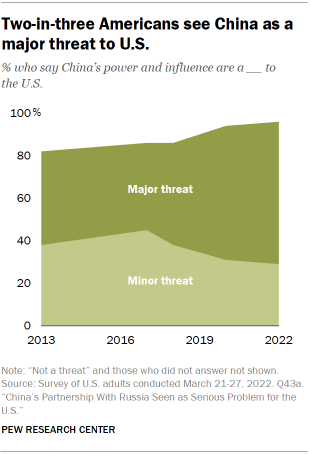
Americans also express concern over China’s power and influence: Two-thirds consider China’s power and influence a major threat, and about three-in-ten see it as a minor threat. The share who express major concern around China’s stature has increased by 23 percentage points since the question was first asked in 2013, but remains generally unchanged since 2020.
Evaluations of China’s power and influence as a major threat differ by demographic characteristics. Men are significantly more likely than women to consider the country’s power and influence a major threat to the U.S. Americans ages 18 to 29 are much less likely than those 30 and older to see China’s power and influence as a significant threat. Likewise, Americans who completed high school or less are less likely than those with more education to say China poses a major threat to the U.S.
Conservative Republicans and Republican-leaning independents are particularly likely to say China’s power and influence is a major threat for the U.S. While about six-in-ten moderate or liberal Republicans and Democrats of all ideologies see the issue as a major threat, more than eight-in-ten conservative Republicans hold this opinion. The share of Republicans who say China’s power is a major threat has also increased by 8 points since 2020, while opinions among Democrats remain relatively unchanged.
Majority of Americans see China-Russia partnership as very serious problem
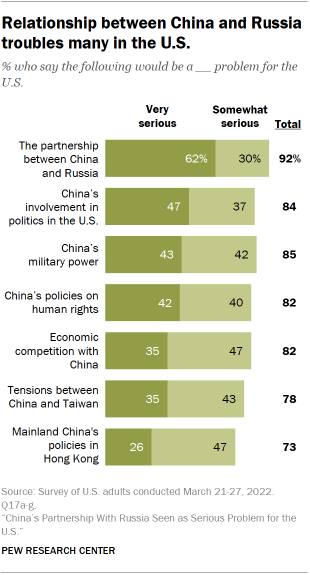
When asked to evaluate seven issues related to the U.S.-China relationship, more than seven-in-ten Americans label each issue very or somewhat serious. At least a quarter consider each of the seven topics a very serious problem.
The partnership between China and Russia, which the two nations recently described as a limitless friendship, stands out as especially concerning to Americans. About six-in-ten say the relationship poses a very serious problem – 15 percentage points higher than the next-highest response. China voted against removing Russia from the United Nations Human Rights Council, and state media continues to refer to the Russian invasion of Ukraine as a “special military operation.”
About half in the U.S. also consider China’s involvement in U.S. politics a very serious concern, and roughly four-in-ten see China’s military power and China’s policies on human rights in the same light. This represents an 8-point decline from 2021 in the share who are very concerned about China’s human rights policies. Conversely, Americans have become more concerned about the relationship between China and Taiwan. While 28% saw the tensions as very serious in 2021, 35% now consider cross-strait tensions a very grave concern. Chinese President Xi Jinping recently warned U.S. President Joe Biden of the consequences of mishandling the cross-strait issue in a mid-March call.
Mainland China’s policies in Hong Kong elicit the lowest level of concern out of all of the items, with only about a quarter labeling them a very serious problem.
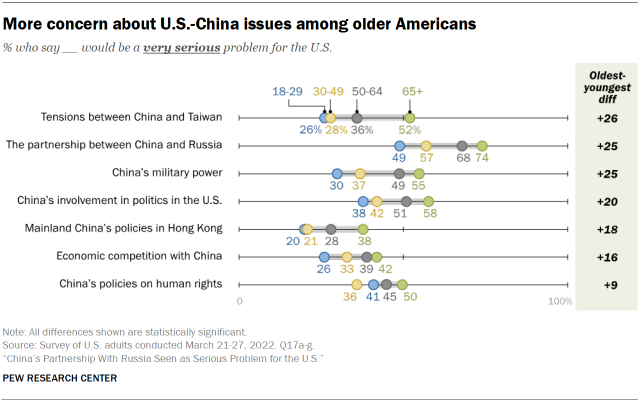
For all seven issues polled, older Americans are more likely than their youngest counterparts to say they would pose a very serious problem to the U.S. The age gap is greatest with regard to tensions between China and Taiwan. While 52% of Americans ages 65 and older consider tensions between China and Taiwan a very serious problem, 26% of those ages 18 to 29 say the same. A 25-point gap is also present when Americans think about the partnership between China and Russia as well as China’s military power. Older and younger Americans are in most agreeance with regard to China’s policies on human rights.
A partisan gap also emerges regarding these issues. Republicans are more likely than Democrats to consider some possible issues in the United States’ relationship with China as very serious problems. Partisans are least aligned when thinking about China’s role in U.S. politics. A 57% majority of Republicans and Republican-leaning independents think China’s involvement in politics is a very serious problem, compared with 39% of Democrats and Democrat-leaning independents. Double-digit differences in attitudes also occur around economic competition with China and China’s military power. Bipartisan agreement is seen when asking about China’s relationship with Russia and China’s human rights policies.
Americans see China’s influence on world stage increasing
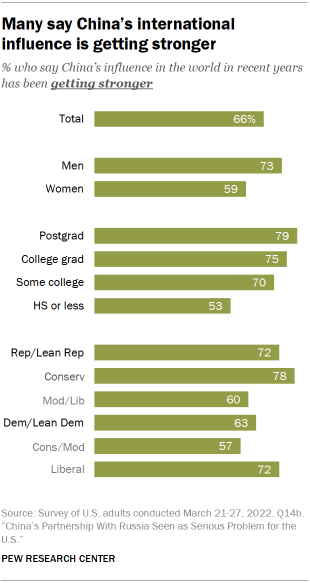
About two-thirds of U.S. adults say China’s influence in the world is getting stronger. Another 22% see China’s influence as staying about the same, and 10% say China’s influence is growing weaker.
A greater share of men than women see China’s influence as getting stronger, and those with more education are more likely than those with less schooling to say China is becoming more influential. While Republicans and Republican leaners are more likely than Democrats and Democratic leaners to say China’s influence is growing stronger, conservative Republicans and liberal Democrats are particularly likely to hold this view. Moderate and liberal Republicans and moderate and conservative Democrats are about as likely to say China’s influence in the world in recent years has been getting stronger.
China and U.S. tied as world’s leading economy, according to Americans
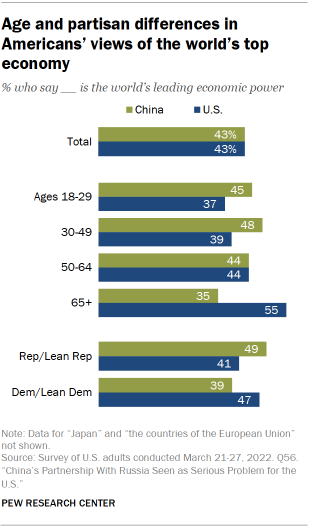
Americans are increasingly likely to see China as the world’s leading economic power. Currently, 43% of Americans consider China the top economic power, with an equal share naming the U.S. In summer 2020, for comparison, 32% of Americans said China is the world’s top economy, while 52% named the U.S. The double-digit increase returns the share of Americans who consider China the world’s top economy to levels last seen in 2014.
Older Americans are less likely to identify China as the world’s leading economic power. While more than four-in-ten Americans in other age groups point to China, only about a third of Americans ages 65 and older express this view.
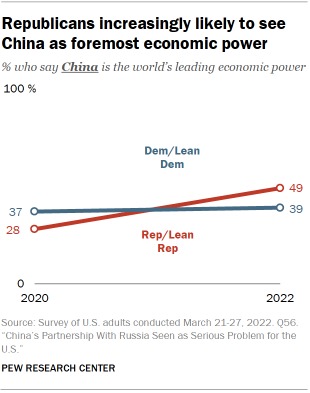
Views of the world’s leading economic power also differ by partisanship. Republicans are 10 points more likely than Democratic counterparts to see China as the world’s leading economic power. Republicans are also more likely than they were before to name China: While just 28% of Republicans considered China as the top economy in summer 2020, the share has increased by 21 points to 49% in 2022. Democratic views on China as the world’s foremost economy have remained largely unchanged.
Evaluations of the U.S. economy play a role in what entity Americans identify as the world’s top economic power. Americans who say the economic situation is good are more likely to say the U.S. is the world’s leading economy, while those who have a negative evaluation of the economic status quo are more inclined to label China the top economy.
Those who see economic competition with China as a very serious problem are also more likely to see China as the top economic power. About four-in-ten of those who say economic competition with China is no more than a somewhat serious problem choose China as the top economic power; 52% of Americans who consider the competition a very serious problem choose China.
To Americans, U.S. remains the world’s preeminent military power
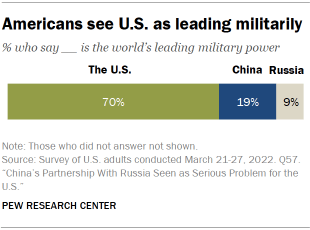
Americans clearly see the U.S. as the world’s top military power compared with China and Russia. Seven-in-ten say the U.S. is the world’s leading military power, compared with about two-in-ten who name China and one-in-ten who name Russia. Still, the share who say China is the highest since the question was first asked in 2016, and has more than tripled from 6% who held that view in 2020.
Men are more likely than women to identify the U.S. over China or Russia as the world’s top military power. Americans ages 65 and older are more likely than their younger counterparts to hold this view. Partisanship also plays a role, with Democrats – especially liberal Democrats – being more likely than Republicans to say the U.S. is the top military on the world stage.
Confidence in Xi low across many demographic groups
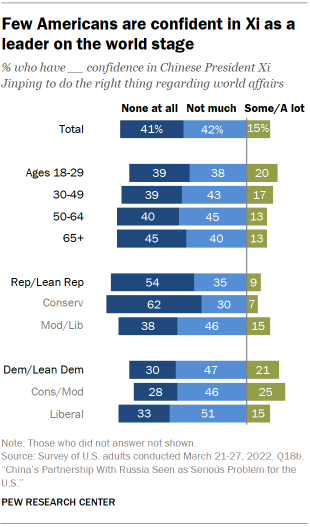
Similar to American views of China, ratings of Chinese President Xi Jinping are low among Americans, split almost equally between those with not too much confidence (42%) and those with no confidence at all (41%). Just 15% of Americans say they have confidence in Xi to do the right thing regarding world affairs.
Unlike patterns of confidence in Ukrainian President Volodymyr Zelenskyy, older Americans are more critical of Xi: 85% of adults ages 65 and older say they do not have confidence in Xi, significantly more than the 77% of adults under 30 who say the same.
Republicans and GOP leaners are more critical of Xi than Democrats and Democratic leaners (89% vs. 77% respectively). Conservative Republicans are especially critical, with 92% saying they have no or little confidence in Xi.


